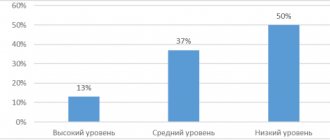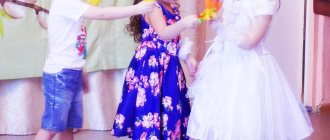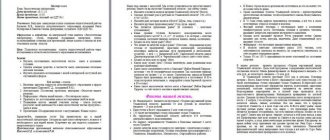Kindergarten project. Volunteering
Project “Little Volunteers”
TYPE OF PROJECT: educational, educational, developmental. According to the profile of knowledge: interdisciplinary project. By the nature of coordination: with open coordination. By level of contacts: at the preschool educational institution level. PROJECT DURATION: long-term. September 2022 – June 2022. PROJECT PARTICIPANTS: children, preschool teachers, parents. RELEVANCE OF THE PROJECT: Relevance. Working with young children, we are annually faced with the problem of their adaptation to the conditions of kindergarten. The child’s adaptation to new social conditions is very painful. After all, a child’s admission to a preschool educational institution is accompanied by a change in his environment, daily routine, nutritional pattern, and system of behavioral reactions (dynamic stereotype) of the child, which leads to the need to adapt to new living conditions and establish social connections. When a child comes to kindergarten for the first time, a serious restructuring of all his relationships with people occurs. The preschool institution is the first to open the world of social and public life to the child. It is known that changing social relationships presents significant difficulties for a child. Anxiety and emotional tension are associated with the absence of people close to the child, with changes in the environment and usual conditions. Many children become restless, whiny, and withdrawn. This sudden change in living conditions can be accompanied by difficult experiences, a decrease in play and speech activity, and seriously affects the child’s health. During this period, the child experiences a deterioration in appetite, up to a complete refusal to eat, sleep and urination disturbances, sudden mood swings, frequent breakdowns and whims. The baby often gets sick, which is primarily due to the child’s reluctance to go to kindergarten. Such children feel insecure in a group and practically do not play with anyone. Accepting new children into the group is associated with some difficulties for teachers. This is due to the fact that several newcomers are immediately brought into the group, constantly in need of attention and affection. This does not allow the teacher to provide the necessary contact with children and find the right approach to them. Every year we asked ourselves how to facilitate the adaptation of young children, what to use to organize successful adaptation. Watching the kids on walks together with older preschoolers, we noticed that the kids look at the older children with interest, and sometimes on their own initiative they approach them, begin to communicate, and the older children do not push the kids away, they show elements of care and attention. To organize the successful adaptation of children, we decided to use the technology of volunteering for older preschoolers, based on the fact that young children do not perceive older children as “alien adults” or as a “threat to themselves.” Having teamed up with teachers of senior preschool children, we decided to develop and implement the “It’s Fun to Play Together” project. THE NOVELTY OF THE EXPERIENCE lies in the fact that the creation of a volunteer movement is expected in a kindergarten with the aim of organizing the successful adaptation of young children. PROJECT IDEA: The creation of a volunteer movement for children will lead to a more active formation of socially significant personal qualities in preschoolers, such as mercy, responsibility, independence, initiative, and the ability to cooperate in a team. HYPOTHESIS: Involving older preschoolers in organizing the lives of young children in kindergarten will significantly facilitate the process of their adaptation to the conditions of the kindergarten and will contribute to the formation of cultural, hygienic and social-communicative skills. THEORETICAL BASIS OF THE PROBLEM In Russia, volunteering in the modern sense began to take shape only in the late 80s and early 90s. XX century. Today it is reflected in the following documents: the Constitution of the Russian Federation (1993), the Civil Code of the Russian Federation (1995), the Law of the Russian Federation “On Charitable Activities and Charitable Organizations” (1995), the Law of the Russian Federation “On Public Associations” (1995). ), the draft Federal Law “On Philanthropy, Patronage and Volunteering”, the Concept of “promoting the development of charitable activities and volunteerism”, which were developed by the Union of Charitable Organizations of Russia. Volunteer (French volontaire - volunteer) is any individual, including foreign citizens and stateless persons, who contributes to the development of volunteerism by carrying out volunteer activities. Volunteering is a wide range of activities, including traditional forms of mutual aid and self-help, formal service provision and other forms of civic participation, that are carried out voluntarily for the benefit of the general public without expectation of monetary reward. It is noted that the issues of educating the social activity of the individual have always been the focus of attention of domestic pedagogy. Ideas about nurturing the social activity of the younger generation are reflected in the works of A.S. Makarenko, N.K. Krupskaya, V.A. Sukhomlinsky, A.S. Makarenko. Modern theoretical and methodological approaches to the development of social activity of young people are reflected in the works of M.I. Rozhkov; more and more studies are appearing in domestic science in which the phenomenon of social personality is considered in the context of socialization (M.V. Poddubnaya, M.V. Demidenko, etc. .) Leading modern psychologists, teachers, sociologists and philosophers believe that youth voluntary social activities today will not only help solve many social problems of society, but also contribute to the development of socially significant qualities of young people, the formation of their active life position. Based on the analysis, we can conclude that the literature pays sufficient attention to the issues of volunteering and social activity of school-age children and teenagers. There is no educational and methodological literature aimed at developing the volunteer movement in preschool age. PROJECT OBJECTIVE: To develop and implement a set of pedagogical activities that ensure the participation of older preschoolers in the process of adaptation of children to the conditions of a preschool institution, in the process of developing cultural, hygienic and socio-communicative skills of young children. TASKS: 1. Analyze the psychological, pedagogical and methodological literature on the issue of organizing the volunteer movement in preschool educational institutions. 2. To determine possible ways for older preschoolers to participate in the process of children’s adaptation to the conditions of a preschool institution, in the process of developing cultural, hygienic and social communication skills of young children. 3. Creation of a development situation in which experience (play, cognitive, social) is transferred in the natural environment from older children to younger ones. RESOURCES: Material: Computer (working with documents), music center. Informational: — Universal Declaration of Human Rights (1948); — Convention on the Rights of the Child (1989); — The Universal Declaration of Volunteers, adopted at the XVI World Conference of the International Association for Voluntary Effort (Amsterdam, January 2001, International Year of Volunteers) with the support of the General Assembly of the United Nations and the International Association for Voluntary Effort (IAVE); — Constitution of the Russian Federation (parts 4 and 5 of article 13, part 2 of article 19, article 30); — Federal Law “On Education” — Civil Code of the Russian Federation (Article 117); — The concept of promoting the development of charitable activities and volunteerism in the Russian Federation, approved by order of the Government of the Russian Federation dated July 30, 2009; — Federal Law of January 1, 2001 “On Public Associations”; — Federal Law of June 28, 1995 “On state support of youth and children's public associations”; — Federal Law of August 11, 1995 “On Charitable Activities and Charitable Organizations.” — Development program of MBDOU No. 105. — Sample Basic General Education Program “From birth to school” edited by Veraksa, Komarova Social: children, parents, teachers. PROJECT IMPLEMENTATION TIME: September 2022 - June 2020 EXPECTED RESULTS: For children of senior preschool age: - children's participation in the volunteer movement will help them master the basic competence without which a person cannot live - communicative competence; - they will learn to make contact, express their point of view, listen, understand and accept the point of view of the interlocutor, and lead a discussion; — They will be ready to solve social problems and behave adequately in various life situations, including conflict ones. For young children: Teach kids tolerance, the ability to give in; facilitate the adaptation and socialization of young children in a team. Education of cultural and hygienic skills. Assimilation by younger preschoolers of norms and values accepted in society. Development of communication and interaction with adults and peers, development of social and emotional intelligence. For educators Expand the understanding of the volunteer movement among children, kindergarten teachers, and parents of students; to form in children the prerequisites for a tolerant attitude towards other people, regardless of cultural environment and ethnicity. To introduce volunteer practice into the activities of the kindergarten, aimed at developing the spiritual and moral education of children. For parents: Involve parents of students in the educational process of the preschool educational institution. Introducing children and parents of pupils to sociocultural norms, traditions of the family, society, and state. Do not be afraid to raise children to be kind and merciful. STAGES AND CONTENT OF THE PROJECT I. stage - preparatory Dates: September 01 - September 15, 2022. Goals: Social and psychological training of volunteers. Activities: .Discussion and approval of the “Little Volunteers” project. Conducting a survey of parents, speaking at a parent meeting of the speech therapy group with a conversation “Raising a Volunteer.” Determining the composition of the volunteer group. Together with the children, developing the rules of the volunteer movement and attributes. Selection and reading of fiction. II. stage – main Dates: September 15 – June. Goals: To introduce a set of pedagogical activities with children to organize the volunteer movement. III. stage – final Dates: June PROJECT RESULTS: • Summing up • Exhibition of joint crafts.
• Documentation of project results. Download Project in kindergarten. Volunteering
We recommend watching:
Project in the senior group of a kindergarten Project in the senior group on the topic “Trees and shrubs in spring” Practice-oriented project for landscaping the territory of a kindergarten Educational project. Second junior group
Similar articles:
Educational and creative project on the theme “Golden Autumn”. Junior group
Project for children of the senior group “Our cheerful garden”
Pedagogical technology “Children volunteers”
Alena Bogacheva
Pedagogical technology “Children volunteers”
RELEVANCE
Currently, teaching staff of preschool educational institutions are intensively introducing innovative technologies . Therefore, the main task of preschool teachers pedagogical technologies that optimally correspond to the goal of personal development.
Preschool age is traditionally considered a period of intense socialization. Modern children live and develop in completely new sociocultural conditions. The extreme employment of parents, the generation gap, the isolation of the child in the family and other trends negatively affect the socialization of modern children. Effective socialization is one of the main conditions for a child’s life in society in general and the child’s personal readiness for school in particular.
In kindergartens, teachers implement the effective socialization “ Children Volunteers ”
, which involves communication between children of different ages and assistance from older preschoolers to younger ones.
Teachers help older preschoolers teach kids how to play various games, dress, sculpt, draw, etc.
Volunteering is a synonym for the word “volunteer”
.
Therefore, volunteering is first and foremost an initiative.
Children begin to develop an active life position, the ability to navigate in society, live among people and, if possible, help them. Volunteering is free help; as a result of their work, the child receives not material payment, but “payment”
as inner satisfaction
The purpose of the technology “ Children volunteers ”
This is the development of a preschool volunteer movement in a preschool educational institution , the main goal of which is to educate a spiritual and moral personality with an active life position and creative potential, capable of self-improvement and harmonious interaction with other people.
Tasks of educational technology
«Children volunteers»
the following:
Development of independence and responsibility in preschoolers, communication skills in a group of different ages
Creation of a development situation in which the transfer of experience (game, cognitive, social)
in the natural environment from older to younger
The ability to show initiative when choosing an occupation and participants in joint activities
The kindergarten uses “ Children Volunteers ” technology
, which involves communication between children of different ages, assistance from older preschoolers to younger ones.
At the first stage, teachers introduce volunteer pupils how to teach children to play various games, dress, sculpt, and draw. For the first time, the children truly begin to feel like the oldest among other children in kindergarten. By helping younger preschool children, child volunteers develop a sense of “adulthood”
, a desire and desire to solve new, more complex problems of cognition, communication, and activity arises. The children realize their responsibility, receive inner satisfaction from their work, and their self-esteem and self-confidence increase.
To organize and implement this technology, it is necessary to provide older children with the opportunity to help or teach younger children at every scheduled moment.
For example: children of a preparatory group for school (at the request of the teacher)
They can include children in a role-playing game, go to their group and teach them this game. You can invite older children to teach the kids a lesson, help them get dressed, or teach them a poem or song.
Such communication between different ages is especially successful during the “Club Hour”
, when older
children take the younger ones by the hand and walk with them throughout the entire territory of the kindergarten, indoors or on a walk.
It is also necessary to draw up a daily and weekly plan for older children to visit younger children. Select a group of children who want to play with the kids.
Organize a “School of Volunteers ”
, that is, specially train older children in the following programs:
"Let's teach kids to play"
,
“We will teach you how to resolve conflicts”
,
"We'll teach you how to dress"
,
“We know how to help conduct classes”
.
And most importantly, the teaching staff must have a person who is actually responsible for the implementation of this technology , monitoring the processes occurring among older and younger children and informing all teachers
Approximate planning of the volunteer movement by month .
September.
— Providing assistance in organizing games with children of the second youngest group during a walk.
— Introducing new breathing exercises to children of the second youngest group during a walk.
— Volunteer children keep order during the club hour.
— Children are volunteers visiting “Veselinka”
.
“Rules of conduct in kindergarten”
October.
Assisting in organizing games with middle school children
Providing assistance with dressing for a walk for children of the second younger group
Introduction to recreational games for older children
Assisting the group in clearing snow on site
— Joint role-playing games based on the situation of the month.
November.
— Assisting nursery children with dressing for a walk.
— Assisting older children in cleaning their beds after sleep.
— Assisting the group in clearing snow on the site
— Volunteer children keep order during the club hour.
— Joint role-playing games based on the situation of the month.
December - January.
— Putting nursery children to bed
— Help with washing for nursery children
— Help in decorating the Christmas tree for the children of the group
— Gifts for kids (snowflakes)
.
— Volunteer children keep order during the club hour.
— Theatricalization “Teremok”
.
Reading poems for the holiday
Children love to act as helpers. Moreover, this title must be earned by your behavior and positive attitude towards this work. Children should receive inner satisfaction and feel proud of the work done. Don't expect material rewards. This is the main essence of this movement.
We can conclude:
- children’s participation in the volunteer movement will help them master the basic competence without which a person cannot live - communicative competence;
- they will learn to make contact, express their point of view, listen, understand and accept the point of view of the interlocutor, and lead a discussion;
— They will be ready to solve social problems and behave adequately in various life situations, including conflict ones.
At the same time, it is important that they not only develop a negative attitude towards bad things, but also are provided with methods of social activity that allow them to move from passive disapproval to active actions among their peers.
Innovative technologies help children not only gain social experience, but also strengthen the desire of children not to miss a single exciting day in kindergarten.
Project “Volunteer is more than a profession!”
The project is aimed at introducing preschoolers to charity and the profession of volunteering. Relevance : Volunteer is more than a profession, it is a calling! Volunteer (from English volunteer - volunteer) is a person who works on a voluntary basis and does not receive payment for his work.
Volunteering is a modern profession, the study of which is not included in the compulsory education of preschool children. However, in accordance with the Federal State Educational Standards requirements, it is necessary to develop in children such qualities as: assimilation of norms and values accepted in society, including moral and ethical values; development of communication and interaction of the child with adults and peers; development of social and emotional intelligence, emotional responsiveness, empathy, formation of readiness for joint activities with peers, formation of a respectful attitude and a sense of belonging to one’s family and to the community of children and adults in the Organization; formation of positive attitudes towards various types of work and creativity. That is why the project “Volunteer is more than a profession!” was organized in our kindergarten. Volunteering teaches you to help those in need, without reminders or prompts; for a volunteer, such qualities as hard work, kindness towards people around you, care and respect for nature, responsiveness and mercy are valuable. How to encourage children to develop such qualities? This project will introduce not only children, but also parents and preschool teachers to this profession, help them learn about charitable organizations in our city, and apply their knowledge and skills for the benefit of the weak and needy.
Goal: To form in preschool children an idea of the profession “Volunteer” through the active cooperation of participants in the educational process and networking with organizations in the city of Achinsk.
Tasks:
- Develop an action plan taking into account the results of the survey and monitoring;
- Organize work to establish public relations on the subject of the project through personal meetings and telephone calls.
- Organize the interaction of all participants in the educational process through the organization of joint activities.
- Cultivate goodwill, mercy, responsiveness, and a desire to help.
Implementation period: from 01.10.16 – 31.05.17
Participants: Teachers of MBDOU “Kindergarten No. 26”, parents, children.
Logistics: Territory of MBDOU "Kindergarten No. 26", music room, gym, teacher-psychologist's office, methodological office. sports and play equipment, theatrical costumes, projector, TV, stereo system, methodological literature, card indexes, Internet resources.
Duration: long term
Project type: socially oriented
Project product: presentation “We are volunteers”, participation in a fair for helping homeless animals in the city of Achinsk, organization of a role-playing game “In the World of Good Deeds” at a preschool educational institution, a joint walk with children with disabilities in; presentation of the project “Volunteer is more than a profession!”
Stages:
Preparatory:
- determination of the topic and purpose of the project;
- development of questionnaires for parents;
- development of monitoring;
- drawing up a work plan for the project “Volunteer is more than a profession!”;
- inclusion of the issue of moral education of children and volunteer activities in parent meetings; conducting conversations with parents.
- organization of cooperation with social organizations of the city.
Practical:
| № | Event | Content | Deadlines | Participants |
| Development of the project “Volunteer is more than a profession!” | Meeting of the “Inclusive Education” working group, development of goals, objectives and event plan. | October 2016 | Dudak D.Yu. | |
| Development of a questionnaire for parents. | Drawing up the optimal content of the questionnaire. Collection and analysis of obtained data. | November 2016 | Group "MBDOU D/s No. 26" | |
| Establishing connections with the volunteer organization “Kind Heart” | Searching for contacts on the Internet, establishing connections through a phone call and personal meeting. Identifying common interests during conversation. | December 2016 | Dudak D.Yu. | |
| Adjustment of the action plan based on the data received. | Meeting of the working group “Inclusive Education”. | December 2016 | Dudak D.Yu. | |
| “Help Friends” campaign Watching the cartoon “Crocodile Gena and Cheburashka” | Collecting necessary supplies for the volunteer organization “Kind Heart” Watching a cartoon in the music room. | January 2022 | Group "MBDOU D/s No. 26" Middle, senior and preparatory kindergarten groups. | |
| View the presentation “We are volunteers” Participation in the fair for helping homeless animals in the city of Achinsk | Event with the participation of volunteers from the city of Achinsk. An event for the interaction of children of parents, preschool teachers with the volunteer organization “Kind Heart” Help with organization city event. | February 2022 | Kindergarten preparatory groups Teachers, children and parents of kindergarten. | |
| Joint production of attributes with children and parents for the role-playing game “In the World of Good Deeds” Organization of the role-playing game “In the world of good deeds” Exhibition of drawings “Volunteer through the eyes of children” | Conducting parent clubs, master classes, leisure activities with parents and children of preschool educational institutions. Conducting open role-playing games with children. Reinforcing the concept of “volunteer”. | March 2022 | Preparatory groups. | |
| Event "Family Walk" | Participation of families in joint walks with children with disabilities in | April 2022 | Preparatory, senior, middle groups. | |
| Social campaign “Parcel to a Veteran” Photo exhibition “Good Without Borders” Questionnaire for parents Analysis of project activities. | Family congratulations to veterans in honor of Victory Day. Final activities reflecting the relevance of the project. | May 2022 | Preparatory, senior, middle groups. Preparatory, senior, middle groups. |
The final stage:
- Design and holding of the photo exhibition “Good Without Borders”;
- Conversations with children and parents;
- Questioning parents;
- Monitoring at the end of the project;
- Analysis of questionnaires for parents;
- Analysis and presentation at the final teachers' meeting.





